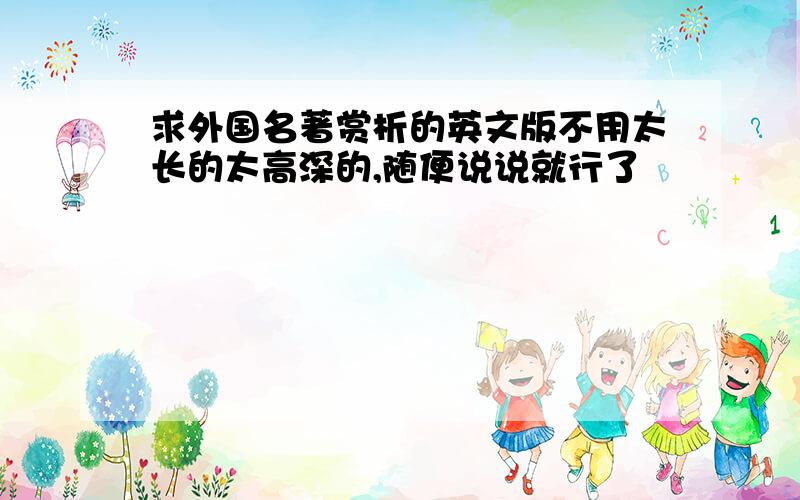求外国名著赏析的英文版不用太长的太高深的,随便说说就行了
来源:学生作业帮助网 编辑:作业帮 时间:2024/11/19 18:45:01

求外国名著赏析的英文版不用太长的太高深的,随便说说就行了
求外国名著赏析的英文版
不用太长的太高深的,随便说说就行了
求外国名著赏析的英文版不用太长的太高深的,随便说说就行了
<老人与海>
Plot Summary
In a small fishing village in Cuba,Santiago,an old,weathered fisherman has just gone 84 days without catching a fish.On the 85th day,he is determined to catch a big,impressive fish.
For years,Santiago has been fishing with a young boy named Manolin.Manolin started fishing with the old man when he was only 5 years old.Santiago is like Manolin's second father,and has taught the young boy everything about fishing.Manolin is extremely loyal to Santiago and makes sure that the old man is always safe,fed and healthy.Manolin's parents,however,force the boy to leave Santiago and fish on a more lucrative fishing boat.
Manolin does not want to leave Santiago,but must honor his duty to his parents.On the new boat,Manolin catches several fish within the first few days.Santiago,meanwhile,decides to head out on the Gulf Stream alone.He feels the 85th day will be lucky for him.He sets out on his old,rickety skiff.Alone on the water,Santiago sets up his fishing lines with the utmost precision,a skill that other fisherman lack.
Finally,he feels something heavy tugging at one of his lines.A huge Marlin has found Santiago's bait and this sets off a very long struggle between the two.The Marlin is so huge that it drags Santiago beyond all other boats and people - he can no longer see land from where the fish drags him.The struggle takes its toll on Santiago.His hands become badly cramped and he is cut and bruised from the force of the fish.
Santiago and the Marlin become united out at sea.They are attached to each other physically,and in Santiago's case,emotionally.He respects and loves the Marlin and admires its beauty and greatness.He sees the fish as his brother.Despite this,Santiago has to kill it.He feels guilty killing a brother,but after an intense struggle in which the fish drags the skiff around in circles,Santiago harpoons the very large fish and hangs it on the side of his boat.He feels brave,like his hero Joe DiMaggio,who accomplished great feats despite obstacles,injuries or adversities.
After enjoying a few moments of pride,a pack of sharks detects the blood in the water and follow the trail to Santiago's skiff.Santiago has to fend off each shark that goes after his prized catch.Each shark takes a huge bite out of the Marlin,but the old man fends them off,himself now bruised,but alive.He sails back to shore with the carcass of his Marlin.He is barely able to walk and slowly staggers back to his hut,where he falls into bed.
The next morning,the boy finds his mentor and cries when he looks at Santiago's bruised hands.He promises he will reject his parents' wishes and vows to fish with Santiago again.
一剧,特有名,Antigone。
Before we determine who is the tragic hero in play “Antigone”, we have to know what a tragic hero is in order to compare the characteristics of both Antigone and Creon to finalize...
全部展开
一剧,特有名,Antigone。
Before we determine who is the tragic hero in play “Antigone”, we have to know what a tragic hero is in order to compare the characteristics of both Antigone and Creon to finalize who is the true tragic hero.
Aristotle, the great ancient Greek philosopher, expressed that a tragic hero is neither purely good nor purely evil. A tragic hero is a person who is usually born and held in high ranks such as royalty. He/she has to hold a tragic flaw, which leads him/her to a disastrous end. I think Antigone and Creon both qualify what Aristotle said to be tragic heroes.
If anything makes Antigone irrational, is her loyalty for her brother. This loyalty forms her tragic flaw and leads her to her own death. Her loyalty to her brother, Polynices, who is ordered to rot unburied by King Creon after his death, makes Antigone absurd and buries her brother without taking any precaution or preparation and considering the consequences. When she gets arrested by Sentry and faces Creon, she doesn’t show her respect to the King, and only tells him to shut himself up. This can only push Creon make his decision of killing Antigone faster.
Creon’s case is easier to understand. He is the King of Thebes. So he has to build up his dominance over his country, otherwise he can’t be in his throne for long. As a King, every motion he makes and every sentence he speaks is a kind of example for his people. If he tolerates Antigone, who is his relative and breaks the decree that he sets for all citizens, he thinks he will lose credibility among his people. In order to establish his kingship, he has to punish Antigone. The only thing is, his decree is not what the people want, so he provokes his people and makes his people think that their King is insensitive and inhumane. Although at last he changes his mind, it is too late. His decision creates a chain reaction and chain deaths. The Creon loses almost his entire family. Who or what makes this? It’s Creon and his own silly decision.
Antigone and Creon are born royal; Antigone and Creon have tragic flaws respectively; Antigone and Creon’s tragic flaws make them both meet the sticky ends of themselves; Antigone and Creon are not all good or all evil. Many people may think that Antigone is a real hero. However, She should be proud that she saves her brother’s soul, but she despises the law and is thoughtless. Too obstinate, you can only say. Most of people may view Creon as evil. However, as a ruler, Creon knows how to gain people’s trust and wants to make Thebes flourish, only his decision is not that great.
Even though the play bares Antigone’s name, I believe that both Antigone and Creon can be considered as tragic heroes because their tragic flaws make them both face tragic ends.
收起